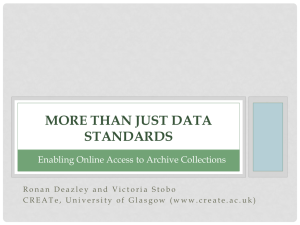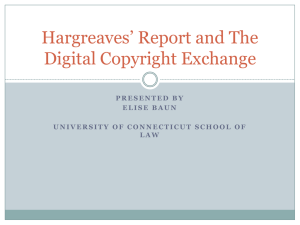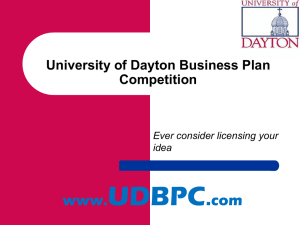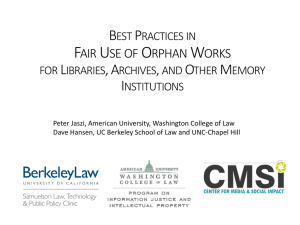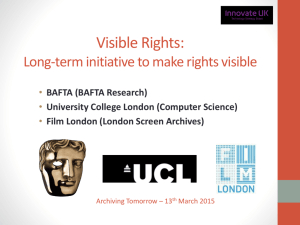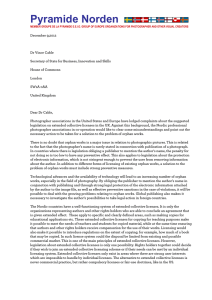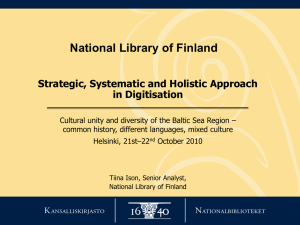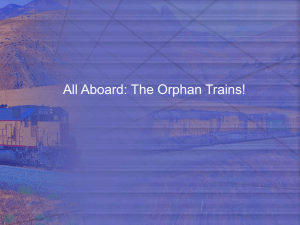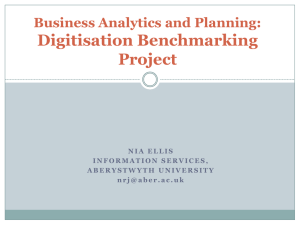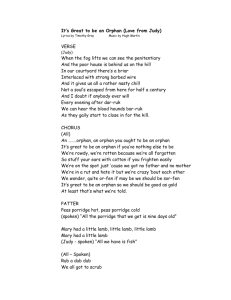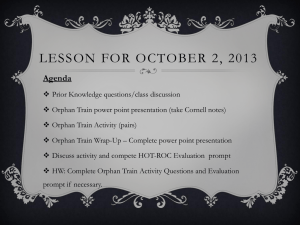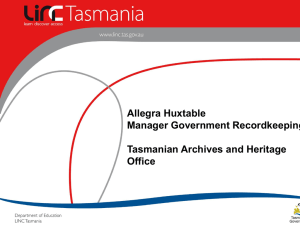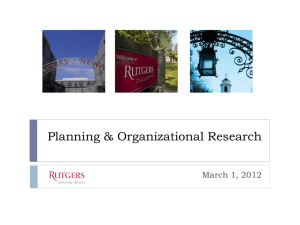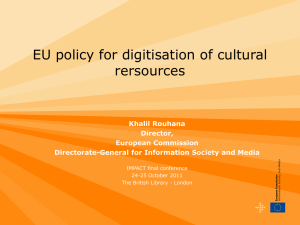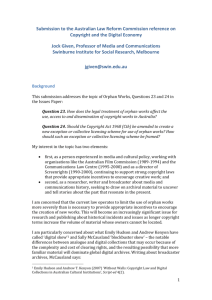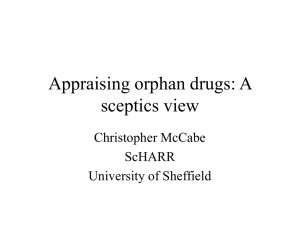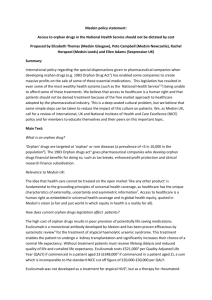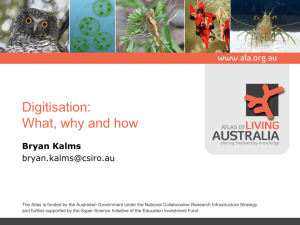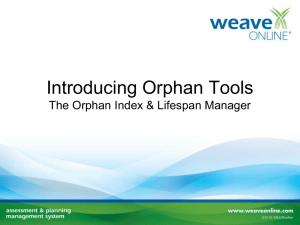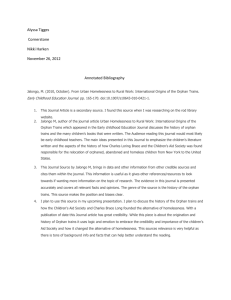Pekka Heikkinen - Bibliotheca Baltica
advertisement
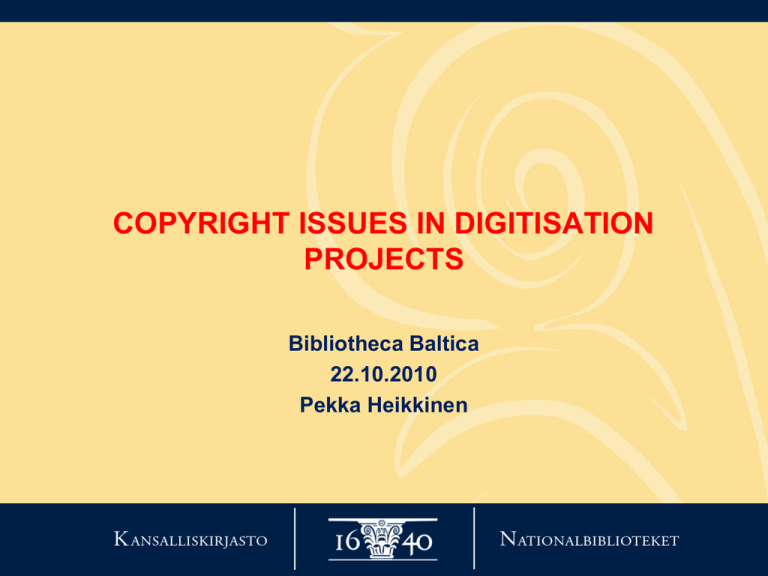
COPYRIGHT ISSUES IN DIGITISATION PROJECTS Bibliotheca Baltica 22.10.2010 Pekka Heikkinen 1. What is copyright? 2. Copyright issues in digitisation projects • • legal framework policy choices 3. CENL licensing guidelines • to be published in the near future 4. The ”orphan works” problem • Nordic model: ECL 5. Rights to metadata I. Copyright issues? 1) What kind of a project? -does copyright actualise at all? -even if copyright has expired, legal questions relating to data protection, ownerhip, contracts etc. 2) What is the legal context? -differences in national copyright legislation -the Nordic countries form one relatively homogenous group COPYRIGHT: A CHALLENGE FOR LIBRARIES Author´s right to deny certain forms of use User perspective: an obligation to ask for permission for certain kind of acts -> COPYRIGHT IS NOT A DEFINITIVE PROHIBITION, EVERYTHING CAN BE AGREED UPON ACCESS TO DIGITAL CULTURAL HERITAGE? -despite some optimistic visions the trend so far has been towards stronger protection – what could libraries do? -it is very difficult to push through new rules of excemption -> how to make best use of possibilities inherent in the present law? -from statutory excemptions to cooperation and contracts? (look for and identify win-win situations) SOME PROBLEMATIC ASPECTS 1) threshold of protection -originality + independent creation -evaluated case by case 2) length of protection -life of the author + 70 years -NOT publication etc. (cf. neighbouring rights) -sometimes it can be worthwhile to take a calculated risk WHAT IS NOT PROTECTED? -only expression is protected, not information/ data contained in the works -however, compilations of data can be protected as databases -a question for the future: what about datamining? COPYRIGHT IS DIFFERENT FROM OWNERSHIP -it is important to make a distinction between ownership relating to physical objects (like books, webarchive etc.) and copyright -whether a work belongs to library´s collections or not: NO IMPORTANCE! DOES THE LIBRARY HAVE ANY RIGHTS? -library´s privileges are exceptions, not ”rights” -> interpreted restrictively -digitisation in itself does not create new copyright -however, a library can have a database right, possibly also protection against ”competitors” (unfair competition/unjust enrichment) etc. -also: a library usually owns the data in its possession II. COPYRIGHT ISSUES IN DIGITISATION PROJECTS 1) right to make copies 2) right to make available to the public 3) orphan works SOLUTIONS? 1) right to make copies -> excemption rule in the Copyright Act 2) right to make available to the public (outside library´s premises) -> licensing 3) orphan works -> what will EU do? CENL LICENSING GUIDELINES CENL copyright group has prepared draft guidelines for contracts with commercial partners (PPP) • • • • • non-exclusivity library has the right to decide which works are digitised and what standards of quality are applied period of preferential access max 5 years, after this no contractual restrictions on use of public domain material library owns the digitised copies and the derived data that result from the project data protection and privacy laws, competition rules as well as the Public Domain are all respected DIGITISATION POLICY OF THE NATIONAL LIBRARY OF FINLAND MATERIAL IN THE PUBLIC DOMAIN • content and metadata offered as freely as possible for use and reuse • irrespective of digitisation funding MATERIAL PROTECTED BY COPYRIGHT • collective licensing, e.g. ECL • especially for research purposes • support for cross-border licensing models III. ORPHAN WORKS -an ”orphan work” is a copyrighted work for which the rightsholder can not be reached/contacted -real problem in mass-digitisation projects -in its Digital Agenda EU Commission has promised to publish a draft directive by the end of this year (?) OPEN QUESTIONS -what kind of search is required to identify a work ”orphan”? -what are the responsibilities of digitising bodies (like national libraries) on the one hand, and organisations representing rightsholders (collecting societies,RRO´s) on the other? NORDIC SOLUTION: ECL -originally created for situations of mass use (photocopying, broadcasting) What is an extended collective license? 1) a library and a rights holder organisation (RRO) reach an agreement (voluntarily) 2) effects of this collective agreement are by law extended also to unrepresented rightsholders -this extension effect covers also orphan works FUTURE OF THE NORDIC MODEL? -national solutions can be accepted, if these are mutually recognized at the EU-level (Tilman Lüder 30.9.) -ECL effect is based on national legislation - what about cross border licensing? -could the ECL-model be transplanted? Or is it tied to the cultural context of the Nordic countries? CURRENT SITUATION IN OUR LIBRARY -ongoing negotiations with KOPIOSTO, a national RRO -aim: to provide access to digitised newspapers -a pilot project with a few publishers -open questions: licensing model, public-private funding, National Digital Library? -solution based on ECL, however KOPIOSTO has not sent its application to the Ministry yet IV. RIGHTS TO METADATA -data in itself is not protected by copyright -even though digitisation does not create new (copy) rights, a library can have rights to metadata (data about data) it has produced -tables of content, thumbnails: a permission might be needed THANK YOU!
